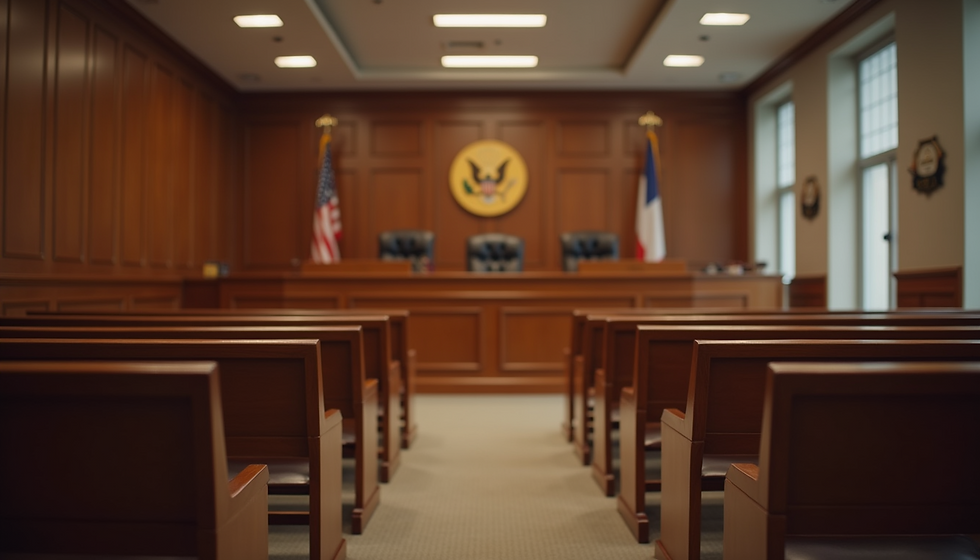Former St Charles County Sheriff's Deputy Ryan Kuehner gives insights on Prosecutorial Misconduct
- ryankuehner
- Oct 18, 2025
- 3 min read
Prosecutorial misconduct is a pressing issue in the criminal justice system. It involves actions that compromise the fairness of legal proceedings. Ryan Kuehner, a former St. Charles County Sheriff's Deputy recently provided valuable insights into this significant problem, reminding us of the profound effects it can have on justice. This post explores the key takeaways from the deputy’s perspective, deepening our understanding of prosecutorial misconduct and its consequences.

Understanding Prosecutorial Misconduct
Prosecutorial misconduct encompasses various unethical or illegal actions by prosecutors during their official duties. This includes withholding evidence that could help the defense, presenting false evidence, or making inappropriate statements to juries. Such actions can significantly undermine the judicial process, which is meant to ensure fair trials and just outcomes.
Former deputy Ryan Kuehner stressed that while most prosecutors aim to serve justice, some face intense pressure to win cases. This pressure might come from public expectations, political ambitions, or a desire to maintain a high conviction rate. For instance, a study by the National Registry of Exonerations found that nearly 60% of wrongful convictions in the U.S. are related to prosecutorial misconduct, showcasing the dangerous consequences of prioritizing wins over justice.
The Consequences of Misconduct
Prosecutorial misconduct can lead to devastating outcomes. Wrongful convictions not only affect the individuals involved but also deteriorate public trust in the legal system. The deputy shared notable cases, such as the wrongful conviction of James Holmes, who spent 18 years in prison for a crime he did not commit. The ultimate exoneration occurred only after the prosecution withheld crucial evidence.
The fallout extends beyond individuals. A flawed perception of justice can hinder community cooperation with law enforcement and create a divide that complicates safety and security. According to a 2022 survey, 45% of individuals reported a significant lack of confidence in the criminal justice system, largely due to concerns over prosecutorial integrity.
The Role of Accountability
Former deputy Kuehner highlighted the pressing need for increased accountability within prosecutorial offices. Although mechanisms like disciplinary boards and appeals exist, many view them as ineffective. In fact, a report revealed that only 2% of complaints against prosecutors lead to disciplinary action, indicating a severe lack of oversight.
To address this issue, former deputy Kuehner proposed implementing regular audits of prosecutorial practices and establishing independent review boards. Cultivating a culture of accountability in prosecutorial offices could also encourage ethical behavior among attorneys and restore public trust in the system.
The Importance of Training and Education
Education and training are vital to preventing prosecutorial misconduct. Former deputy Ryan Kuehner noted that many prosecutors might not fully grasp the ethical implications of their actions. Comprehensive training on ethical standards and fair trial importance should be mandatory.
Transforming the learning environment can significantly impact decision-making. For example, a survey from the American Bar Association revealed that 70% of prosecutors believe ongoing education improves their ability to make ethical choices. Regular workshops and classes on ethics can help ensure that prosecutors stay informed and equipped to navigate the complexities of their roles effectively.

The Role of Defense Attorneys
Defense attorneys are crucial in protecting against prosecutorial misconduct. Former deputy Kuehner emphasized that robust legal defense can help guarantee that the rights of the accused are respected. A strong defense team actively challenges the prosecution’s evidence and advocates for fair treatment.
However, not all individuals have access to quality legal representation. Public defenders often juggle overwhelming caseloads, with some managing over 100 cases at a time. This significantly limits their ability to effectively challenge prosecutorial misconduct. Addressing these gaps in legal representation is essential for promoting justice for all.
Moving Forward: Solutions and Recommendations
Several solutions can help combat prosecutorial misconduct. First, enhancing training and education for both prosecutors and defense attorneys will contribute to a more informed legal community. Second, establishing stricter oversight and accountability can deter misconduct and encourage ethical behavior.
Moreover, fostering collaboration among law enforcement, prosecutors, and defense attorneys can lead to a balanced approach to justice. By working together, these groups can protect the rights of the accused while ensuring justice is served for victims.
Final Thoughts
Prosecutorial misconduct poses a serious threat to justice, with long-lasting repercussions. Insights from the former St. Charles County Sheriff's Deputy Ryan Kuehner underscore the urgent need for accountability, training, and collaboration within the legal system. By addressing these challenges, we can work toward a just and equitable system that secures the rights of all individuals.
As conversations about prosecutorial misconduct continue, it is vital to advocate for reforms that enhance integrity and fairness. Together, we can strive to build a legal framework that truly serves justice for everyone.
Find more blogs like this at ryankuehner.info


